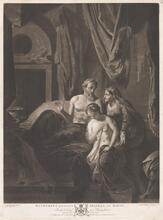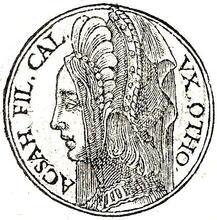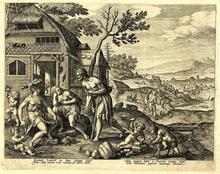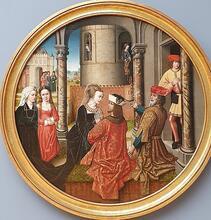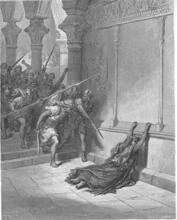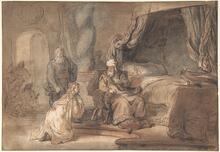Wife of Korah: Midrash and Aggadah
The wife of Korah is characterized in the midrash as a scheming woman, driven by her desire for honor and status and wielding great influence over her husband. She is responsible for causing her husband to rebel against Moses and Aaron. The secret of her powers of persuasion lies in her use of well-known facts, to which she gives novel interpretations of her own, and her casting the reality with which her husband is familiar in a negative light. Her arguments first play upon his emotions and end with an appeal to logic. Her ability to persuade Korah to join the rebellion eventually leads to Korah’s death at the end of the revolt narrative.
Inciting Rebellion
Korah’s wife, who is not mentioned anywhere in the Torah she-bi-khetav: Lit. "the written Torah." The Bible; the Pentateuch; Tanakh (the Pentateuch, Prophets and Hagiographia)Torah, is censured by the A type of non-halakhic literary activitiy of the Rabbis for interpreting non-legal material according to special principles of interpretation (hermeneutical rules).midrash both for causing her husband to rebel against Moses and Aaron and for her responsibility for the death of all the members of her household. Num. 16 relates that Korah rallied a band of rebels and that they assembled against Moses and Aaron, whom they challenged (v. 3): “You have gone too far! For all the community are holy, all of them, and the Lord is in their midst. Why then do you raise yourselves above the Lord’s congregation?” At the end of the revolt narrative, the malcontents meet their fate: Korah is punished by the earth opening its mouth and swallowing him and his household, with all that belonged to them, and they go down alive into Sheol.
The midrash blames Korah’s wife for inciting her husband to mutiny against Moses and Aaron. She said: “See what Moses has done: he is king, he has appointed his brother High Priest, and his brother’s sons he has made deputy High Priests. If terumah [the heave-offering] is brought, he declares that it must be given to the priest. If maaser rishon [first tithe, that is given to the Levites, including Korah] is brought, Moses commands that a tenth part of it must be given to the priest! Moses shaved all your hair when you came to serve in the Tabernacle and treats you like refuse. He wants you to be shaven and not fine-looking.” Korah replied to her: “But Moses also has shaven all the hair of his body like the other Levites!” To which his wife retorted: “Moses planned everything for his own aggrandizement. He said to himself: ‘Let me die with the Philistines’ [Jud. 16:30]—thus you will be abased, and he will be exalted.” She also said to him: “Moses also ordered you to put tekhelet in the zizit [one of the eight cords of the fringe (zizit) at the corners of one’s garment must be of tekhelet, a special blue color]. If you think that tekhelet is important to fulfill the commandment, then make cloaks entirely of tekhelet, and cover all those in your band in cloaks of tekhelet, without fringes. Why should such not be deemed fit for the commandment of zizit? Rather, Moses must have fabricated the entire matter!” (BT Sanhedrin 110a).
Manipulation Tactics
This midrash presents Korah’s wife as a scheming woman, driven by her desire for honor and status, who wields great influence over her husband. Nothing is sacred in her attempt to persuade her husband to rebel against Moses and Aaron. The secret of her powers of persuasion lies in her use of well-known facts, to which she gives novel interpretations of her own, and her casting the reality with which her husband is familiar in a negative light. Her arguments first play upon his emotions and end with an appeal to logic. First, she arouses Korah’s jealousy and ire by pointing out discrimination: Moses apportions the senior positions to those close to him; according to her, the priestly and Levitical gifts, as well, are the personal perquisites of Moses and his intimates, while the other Levites derive only minimal benefit from them. Then she moves to a personal note, indicating the humiliation suffered by the Levites when their heads are shaven. She finishes with a rational argument—there is no logic in the commandments taught by Moses—exemplifying this claim with the tekhelet of fringed garments. The serious argument underlying her words is that Moses himself concocted the commandments and that they were not uttered by God. Korah’s wife demonstrates impressive expertise in the laws of the priestly gifts and those of zizit, but she uses her erudition to negative ends.
The Rabbis apply the first part of Prov. 14:1: “The wisest of women builds her house” to the wife of On son of Peleth, since she saved her household with her wisdom. In contrast, the end of this verse: “but folly tears it down with its own hands” refers to the wife of Korah, because of her responsibility for the ruin and destruction of her household (BT Sanhedrin 110a).


